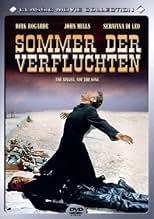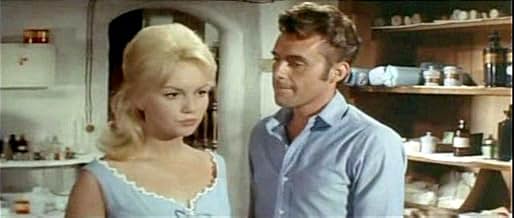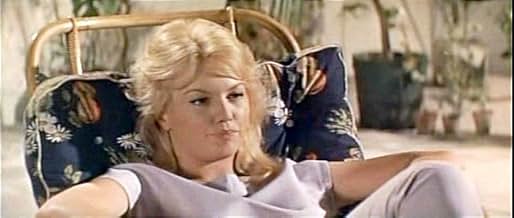VALUTAZIONE IMDb
6,2/10
736
LA TUA VALUTAZIONE
Aggiungi una trama nella tua linguaIn a small Mexican town, a Catholic priest (Sir John Mills) and a local bandit (Sir Dirk Bogarde) clash, but the brave priest ultimately wins the outlaw's respect.In a small Mexican town, a Catholic priest (Sir John Mills) and a local bandit (Sir Dirk Bogarde) clash, but the brave priest ultimately wins the outlaw's respect.In a small Mexican town, a Catholic priest (Sir John Mills) and a local bandit (Sir Dirk Bogarde) clash, but the brave priest ultimately wins the outlaw's respect.
- Regia
- Sceneggiatura
- Star
Norman Florence
- Vito
- (as Nyall Florenz)
Arthur Brough
- Burning haystacks Farmer
- (non citato nei titoli originali)
Recensioni in evidenza
My first (and for a long time) only viewing of this film was way back in the mid-1980s (during the early days of VHS in my neck of the woods) via a tape of a local TV screening my father loaned from a friend of his; even though I was aware of a couple of Italian TV showings over the years, I never managed to catch up with it – until another friend of my father’s alerted me (around Good Friday of last year) that it had been released – and, as it happens, subsequently deleted – on R2 DVD in the UK…which is how I eventually reacquainted myself with it on the day marking the centenary of one of its lead actors, John Mills. The reason I went into such detail about my previous experience with this particular film is because, even though it’s been 23 years since my sole viewing of (what is nowadays perhaps considered) a fairly obscure title, I myself have never forgotten it.
The ‘rejected priest in a godless Mexico’ theme recalls John Ford’s THE FUGITIVE (1947) and Luis Bunuel’s NAZARIN (1959), while the ‘homosexual undertones in a Western setting’ angle is reminiscent of the Howard Hughes/Howard Hawks concoction THE OUTLAW (1943) – with henchman Laurence Naismith’s ambiguous father-son-lover relationship with bandit leader Dirk Bogarde being particularly a throwback to the Thomas Mitchell/Jack Beutel one in the earlier film. Incidentally, THE SINGER NOT THE SONG’s controversial ending plays almost like a male version of that featured in yet another steamy over-the-top Western – DUEL IN THE SUN (1946)! This was the fourth of six collaborations between Mills and director Baker and which also included the latter’s debut, THE October MAN (1947) – a well-regarded thriller I’d love to watch and which, incidentally, has just been released on R2 DVD as part of a “John Mills Centenary Collection”. Bogarde, who himself considered the whole thing “beyond camp”, is almost always completely black-clad and, at one point, even sports cool shades!; here, he was already beginning to bravely delve on screen into his real-life gay side – which would come to full fruition later that same year in Basil Dearden’s VICTIM and other later acclaimed international films.
Nigel Balchin’s complex screenplay is at once fascinating and heavy-going, occasioning a few lulls particularly during the last third of the film’s lengthy 132-minute duration; besides, the ‘alphabet murders’ element to Bogarde’s tyrannical rule – not to mention pretty, pouting Mylene Demongeot’s forbidden love for middle-aged priest Mills – isn’t very convincing. On the other hand, Otto Heller’s spectacular color cinematography and Philip Green’s playfully evocative score, stand out as undeniable assets to the film. Having said that, DD Video’s full-frame presentation would have usually put me off acquiring a title on DVD – but, for the reasons delineated in my introduction, I gladly made an exception in this case.
Roy Ward Baker’s accompanying brief interview is very interesting: he wasn’t keen on doing the film himself but concedes now that it is beautifully-made; he also discloses that, initially, it was supposed to star Richard Burton instead of John Mills (but he was only interested in playing the bandit…except that the role was always intended for Bogarde – this, in fact, turned out to be the last film the latter made under contract to Rank) and that there was a mysterious enmity between the two male stars. I usually enjoy listening to Ward Baker’s Audio Commentaries (on his Hammer flicks) and, while I would have liked one for THE SINGER NOT THE SONG as well, the fact that he is now in his nineties and that he does not have fond memories of the shooting of the picture has understandably put paid to that prospect!
The ‘rejected priest in a godless Mexico’ theme recalls John Ford’s THE FUGITIVE (1947) and Luis Bunuel’s NAZARIN (1959), while the ‘homosexual undertones in a Western setting’ angle is reminiscent of the Howard Hughes/Howard Hawks concoction THE OUTLAW (1943) – with henchman Laurence Naismith’s ambiguous father-son-lover relationship with bandit leader Dirk Bogarde being particularly a throwback to the Thomas Mitchell/Jack Beutel one in the earlier film. Incidentally, THE SINGER NOT THE SONG’s controversial ending plays almost like a male version of that featured in yet another steamy over-the-top Western – DUEL IN THE SUN (1946)! This was the fourth of six collaborations between Mills and director Baker and which also included the latter’s debut, THE October MAN (1947) – a well-regarded thriller I’d love to watch and which, incidentally, has just been released on R2 DVD as part of a “John Mills Centenary Collection”. Bogarde, who himself considered the whole thing “beyond camp”, is almost always completely black-clad and, at one point, even sports cool shades!; here, he was already beginning to bravely delve on screen into his real-life gay side – which would come to full fruition later that same year in Basil Dearden’s VICTIM and other later acclaimed international films.
Nigel Balchin’s complex screenplay is at once fascinating and heavy-going, occasioning a few lulls particularly during the last third of the film’s lengthy 132-minute duration; besides, the ‘alphabet murders’ element to Bogarde’s tyrannical rule – not to mention pretty, pouting Mylene Demongeot’s forbidden love for middle-aged priest Mills – isn’t very convincing. On the other hand, Otto Heller’s spectacular color cinematography and Philip Green’s playfully evocative score, stand out as undeniable assets to the film. Having said that, DD Video’s full-frame presentation would have usually put me off acquiring a title on DVD – but, for the reasons delineated in my introduction, I gladly made an exception in this case.
Roy Ward Baker’s accompanying brief interview is very interesting: he wasn’t keen on doing the film himself but concedes now that it is beautifully-made; he also discloses that, initially, it was supposed to star Richard Burton instead of John Mills (but he was only interested in playing the bandit…except that the role was always intended for Bogarde – this, in fact, turned out to be the last film the latter made under contract to Rank) and that there was a mysterious enmity between the two male stars. I usually enjoy listening to Ward Baker’s Audio Commentaries (on his Hammer flicks) and, while I would have liked one for THE SINGER NOT THE SONG as well, the fact that he is now in his nineties and that he does not have fond memories of the shooting of the picture has understandably put paid to that prospect!
I saw this movie in 1961 at the army base in Schofield Barracks and was struck by its import. I was an eternal optimist and had a very naive faith that God was in control. The movie really shook me out of this blind faith. That night I sat on my bunk and meditated on this dilemma and asked that I be restored or lead to a reality of truth. I was certain that I would be in battle soon and wanted to experience a sense of truth before this happened. I only went to the movie out of boredom and was not expecting the impact it made on me. The title says it all. I was struck by the simple plot. The actors who were unknown to me provided a great contrast of what is good and evil. The actress was simply beautiful and I always wondered why I had never seen her in anything after that. The love shown between the desperado and the priest was very touching.
This movie leaves so many various impressions on a viewer, it is impossible to form a final opinion. To begin with, it is a British western, with two great British actors in the leads. Then, there is the actress, looking quite like Bardot. And then, even the atmosphere reminded me of "Et Dieu... crea la femme" in certain scenes (Bogarde called it camp, and you can see why).
During certain scenes you are thinking that it will go the way of other movies with similar plot ("Satan never sleeps" is an example), ending in infinite praise of the religion, without measure or sense. But then it turns the other way and surprises you. And in the end you come to see that even some deep religious deeds can be interpreted as acts of latent homosexual love... I know it sound bad but, somehow, unlike modern movies, the topic is introduced subtly.
Anyway, you should see it yourself and decide whether you like it or not...
I watched this film not expecting terribly much, but was blown away by the subject matter and, more importantly, how it was handled by the skillful actors in the film.
The story centres around a priest, played by John Mills, and a local bandit, excellently played by Dirk Bogarde.
Without spoiling the ending, the story focuses on the conflict between the Priest and Anacleto. More importantly, it is a tale of the pursuit of religion, and the issues involved.
John Mills excellently plays the well intentioned priest, caught between his own feelings and the duties to the church. Dirk Bogarde plays the local bandit, Anacleto, and portrays a truly intelligent athiest at the mercy of his own desires and ideologies.
This is a great story of characterisation, and of the sometimes misplaced loyalties that we place on ourselves - be it through religion, or otherwise.
Watch out for the excellent and hard hitting conclusion, with some excellent summarising by both Anacleto and the Priest at the storys conclusion.
A must see for those who enjoy a deeper meaning behind the action and dialogue.
The story centres around a priest, played by John Mills, and a local bandit, excellently played by Dirk Bogarde.
Without spoiling the ending, the story focuses on the conflict between the Priest and Anacleto. More importantly, it is a tale of the pursuit of religion, and the issues involved.
John Mills excellently plays the well intentioned priest, caught between his own feelings and the duties to the church. Dirk Bogarde plays the local bandit, Anacleto, and portrays a truly intelligent athiest at the mercy of his own desires and ideologies.
This is a great story of characterisation, and of the sometimes misplaced loyalties that we place on ourselves - be it through religion, or otherwise.
Watch out for the excellent and hard hitting conclusion, with some excellent summarising by both Anacleto and the Priest at the storys conclusion.
A must see for those who enjoy a deeper meaning behind the action and dialogue.
We all bring our own life experiences to a movie and understand it on different levels. With themes like religious faith, love & sexuality, and what makes a good man, it is sometimes easy to see what we want to see ... what relates to us personally.
The two main protagonists reach different conclusions: for Anacleto it is "the singer, not the song" which is the opposite of Fr Keogh's. In the context of the movie we can ponder these two extremes and reach our own conclusion which may be an intersection of both.
Anacleto's hostility towards the Church is explained in part by his words: "It must be heartbreaking to fall in love with a man you can never have ... I understand this". It is as close as the script comes to identifying him as homosexual though his rather bizarre outfits are meant to convey the same notion along with his lack of interest in the beautiful & desirable Locha.
The death embrace at the end illustrates the feelings of the two men ... Anacleto clings to the man, Keogh clings to his faith. Only in death are the two reconciled.
The two main protagonists reach different conclusions: for Anacleto it is "the singer, not the song" which is the opposite of Fr Keogh's. In the context of the movie we can ponder these two extremes and reach our own conclusion which may be an intersection of both.
Anacleto's hostility towards the Church is explained in part by his words: "It must be heartbreaking to fall in love with a man you can never have ... I understand this". It is as close as the script comes to identifying him as homosexual though his rather bizarre outfits are meant to convey the same notion along with his lack of interest in the beautiful & desirable Locha.
The death embrace at the end illustrates the feelings of the two men ... Anacleto clings to the man, Keogh clings to his faith. Only in death are the two reconciled.
Lo sapevi?
- QuizAfter the J. Arthur Rank Organisation insisted that Sir John Mills had to play the priest, Sir Dirk Bogarde became so incensed that he told director Roy Ward Baker: "I promise you, if Johnny plays the Priest, I will make life unbearable for everyone concerned."
- Citazioni
Anacleto Comachi: Is it the song that is good, or the singer that makes it so?
I più visti
Accedi per valutare e creare un elenco di titoli salvati per ottenere consigli personalizzati
- How long is The Singer Not the Song?Powered by Alexa
Dettagli
- Tempo di esecuzione2 ore 12 minuti
- Mix di suoni
- Proporzioni
- 2.35 : 1
Contribuisci a questa pagina
Suggerisci una modifica o aggiungi i contenuti mancanti




















